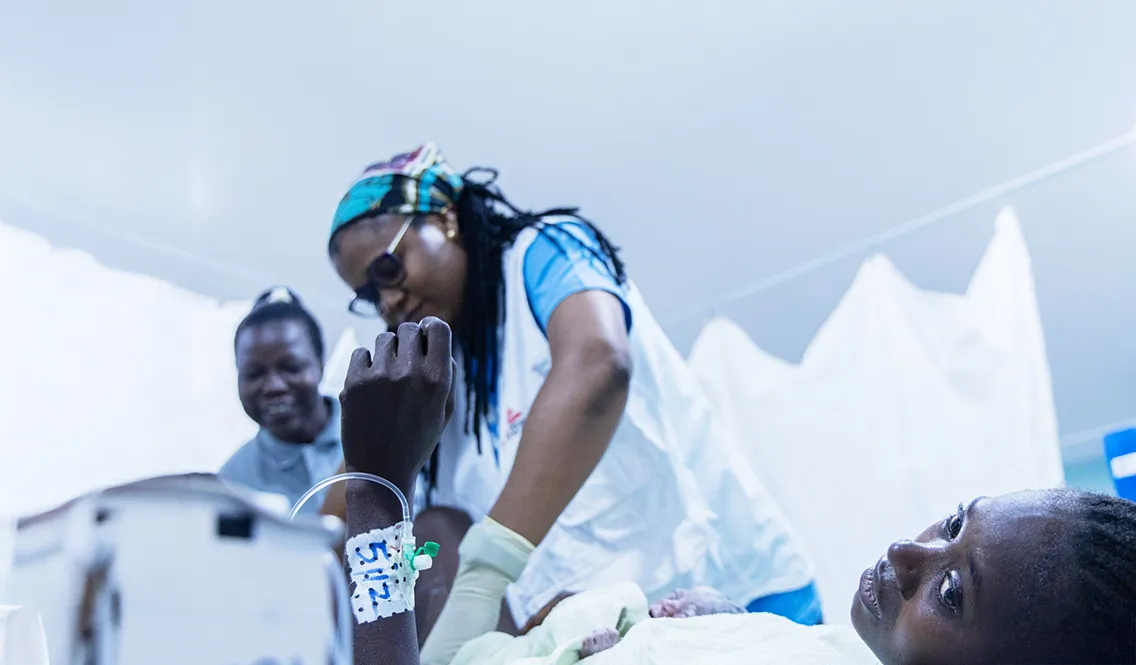
On 12 December 2023 Nigeria’s President, Bola Ahmed Tinubu, declared that “health is back on the front burner of Nigeria’s policy priorities.” This declaration was a pivotal moment, signalling a renewed commitment to the well-being of Nigerians under the Renewed Hope Agenda. With this bold vision, the administration launched the National Health Sector Renewal Investment Initiative (NHSRII) and signed a compact with all 36 states and the Federal Capital Territory, setting in motion a transformative journey to rebuild Nigeria’s health system into one that is equitable, resilient, and accessible to all.
At the heart of these reforms is the NHSRII, which provides a unified framework to eliminate inefficiencies, reduce fragmentation, and align efforts across all levels of government, the private sector, and development partners. Guided by the principle of “one vision – one conversation, one budget, one report,” the NHSRII has mobilised over $3bn in external funding, with significant domestic investments projected over four years. This sector-wide approach has established Nigeria as a leader in health systems accountability across Africa.
Nowhere is the impact of this framework more evident than in the revitalisation of primary healthcare centres (PHCs), the cornerstone of Nigeria’s health system. More than 2,100 PHCs have been upgraded to full functionality, with another 3,000 in progress and on track to be fully functional by end of 2025, ensuring no Nigerian will need to travel more than five kilometres to access care.
Backed by a 46bn naira ($30m) direct financing facility, disbursed this year through the revamped Basic Health Care Provision Fund to more than 8,000 facilities, these PHCs now deliver essential services, from immunisations to maternal and child healthcare. The Sector-Wide Approach has been critical to achieving these results, with tools like joint annual reviews, annual operational plans, and state dialogue mechanisms driving accountability, alignment, and efficient resource use. Real-time dashboards ensure resources are deployed efficiently and transparently.
Life-changing impact
For women like Hadiza in Gombe, who no longer has to walk 10 kilometres while pregnant to reach a clinic, these improvements are more than just policy – they are life-changing.
The challenges of maternal and newborn health have long been a source of pain for families across Nigeria. The Maternal Mortality Reduction Innovation Initiative was launched to change this, initially targeting 172 highest-burden local government areas. As part of the expanded National Health Insurance Authority package, pre-qualified poor and vulnerable women now have access to free caesarean sections at accredited facilities, addressing obstetric complications that previously led to tragic outcomes. This initiative is supported by the National Emergency Medical Service and Ambulance System, which ensures emergency transport for those in critical need.
Amina, a young mother in Bauchi State, is one of thousands whose life – and that of her baby – was saved through this program. Her story reminds us why expanding access to quality, life-saving care remains essential.
In addition to saving mothers and children, Nigeria is intensifying its fight against infectious diseases. The government has made significant investments in malaria prevention, treatment, and vaccination, aiming to eradicate a disease that continues to claim lives, especially among children under five.
The recent receipt of over one million doses of the R21/Matrix-M malaria vaccine from Gavi the Vaccine Alliance, and its rollout in high-burden states such as Kebbi and Bayelsa, is a testament to this commitment. Furthermore, strategic collaborations with the World Health Organization (WHO), The Global Fund, the US Government and other partners have helped scale up efforts to end diseases such as tuberculosis and HIV/AIDS. These initiatives reflect the government’s unwavering focus on improving health outcomes for all Nigerians.
Robust financing
To make these reforms sustainable, robust financing has been a cornerstone of this administration’s strategy. In 2023, the health sector budget increased by an unprecedented 41.5%, rising from 826.9bn naira ($532m) in 2022 to 1.17 trillion naira ($753m). This investment has revitalised PHCs, expanded health insurance coverage, and strengthened health security. Accounting tools ensure transparency in how these funds are deployed, bolstering public trust in our health system, which has risen from 37% to 54% between 2023 and 2024. Another landmark achievement under the NHSRII has been Nigeria’s strengthened vaccination efforts, which have played a critical role in combating emerging and re-emerging diseases. Enhanced immunisation campaigns have led to significant progress in stopping outbreaks of diseases such as diphtheria. These achievements exemplify the power of collaboration between government, development partners and communities to protect public health.
Financial protection for families remains, however, a pressing challenge. While the number of people enrolled for health insurance coverage under the National Health Insurance Authority has grown by over 2m in the past year – bringing the total to 19.2m Nigerians – out-of-pocket health expenditures still remain too high. The Medical Relief Program will provide targeted subsidies for essential services, ensuring that financial hardship is no longer a barrier to care.
A trained workforce
Our health workforce is the foundation of all of these reforms. Over 53,000 frontline workers have been retrained in the past year, out of a target of 120,000 within three years. Community health workers, often the only connection between remote villages and the broader health system, are now better equipped to deliver immunisations, enlighten families and provide referrals. Through the Presidential Initiative for Unlocking the Healthcare Value Chain, over $1bn in investments have been catalysed, with 42 business cases finalised for the local production of pharmaceuticals and medical devices. Partnerships with global firms are fostering innovation and technology transfer, making Nigeria a hub for healthcare manufacturing.
Health security has also been prioritised, with emergency operations centres now established in all geopolitical zones and enhanced genomic surveillance systems allowing for faster detection of diseases such as diphtheria and mpox. The launch of the Nigeria Climate Change and Health Vulnerability Assessment Report has positioned Nigeria as a leader in integrating climate resilience into health systems, ensuring that we are prepared for the challenges of a changing world.
Significant progress has also been made in tertiary care, with six state-of-the-art cancer treatment centres being developed in partnership with the Nigeria Sovereign Investment Authority. Two of these are set to open in May 2025, providing much-needed oncology services and reducing the financial and emotional toll of medical tourism for Nigerian families.
We must also acknowledge the challenges that remain. Geographic disparities in access to care, the growing burden of non-communicable diseases and the need to sustain financial reforms will require our focus. The progress we have made demonstrates that transformative change is not only possible but already underway. This progress is visible in the growing confidence of the public, the strengthened trust of our partners, and most importantly, in the lives that have been saved and transformed across our nation.
Health has been elevated from a sectoral concern to a national imperative. The president’s pledge – that no Nigerian woman will lose her life when giving birth, no child will suffer needlessly for lack of care, and no family will face financial ruin from illness – has inspired this transformative journey.
Together, with this administration’s enduring support and the collective resolve of all Nigerians, we will continue to strengthen our health system, ensuring it leaves no one behind. This is not just about health – it is about delivering hope, equity, and opportunity for generations to come.








Comments